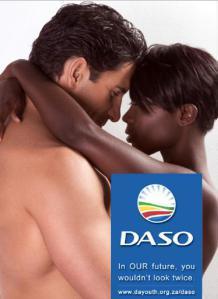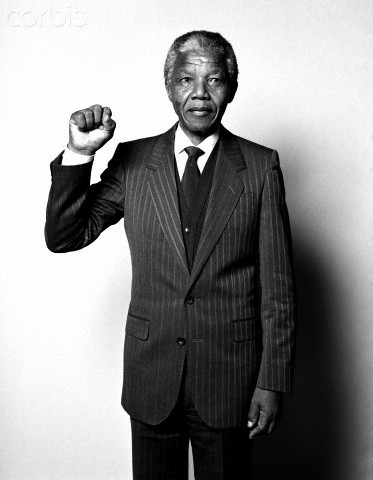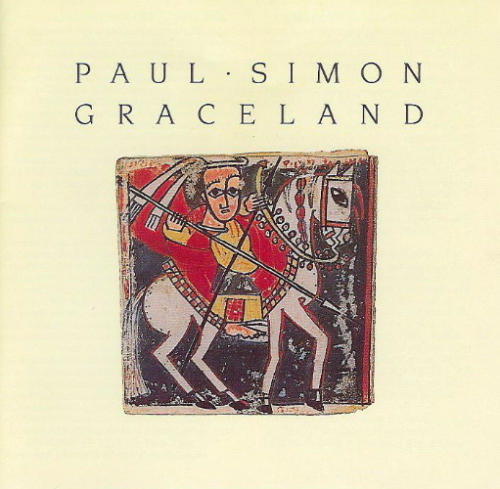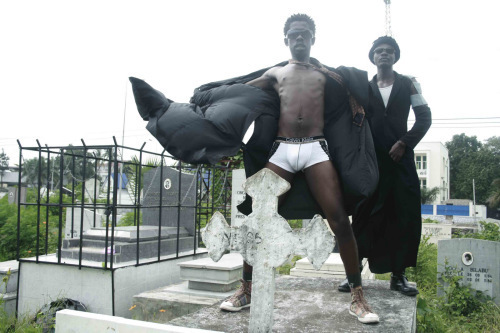Sean Jacobs's Blog, page 573
January 23, 2012
Benetton Politics

South Africa's Democratic Alliance, usually very slick and media savvy, have really outdone themselves with a new campaign by its youth wing. Fresh out of leader Helen Zille's troublesome 'AIDS Gestapo' views and calling the ever disgruntled musician Simphiwe Dana a "Professional Black" on Twitter, the DA now give us this poster, above.
At first it looks like a parody. One Facebook commenter wrote "I thought this was a Viagra Commercial?" More like a United Colors of Benetton photo shoot from the 90s that never made it to the billboards. But to me what's most interesting is the tagline: "In OUR future, you wouldn't look twice." We're not sure who the DA is targeting here. That voting for them means that one day South Africans won't be the racists they assume we already are?
With comments for this picture on their Facebook group nearing 700, I could only bear to read about 20. The debate has descended into racist conservatives calling the photo blasphemous, while 'liberals' are left defending the campaign and arguing for the normality of an interracial couple. Others have gone down the road of arguing which racial group is more oppressed. Anyone posting anything worth reading gets drowned out by inflammatory racial discourse. Is this what they wanted? Of course. The DA has since released a statement on the page saying "Thanks everyone for the comments, both good and bad, this is what we want young people to be about — debate and dialogue … we will continue to provoke this kind of debate until we live in a society truly free from all forms of prejudice — one nation, one future." Yes, this is called "debate and dialogue" in South Africa.
The only good to come out of any of this will be to see what parodies emerge online. A few have already shown up on social media sites. Maybe the DA can use this slogan: "Viagra politics. It'll get you fired up quick."

Sapeurs and Cemeteries
'Vanité Apparente', the exhibition of recent work by Congolese artist Yves Sambu — bringing together his interest in contemporary sapeurs and cemeteries — runs until February 24 in Brussels. Sometimes a good antidote to the colorful portrayal of the 'Society of Tastemakers and Elegant People' (think of the photographs by Héctor Mediavilla Sabaté, Daniele Tamagni or Baudouin Mouanda) works refreshing.

African Films in Rotterdam
The website of this year's International Film Festival in Rotterdam (running till February 5) comes with a neat feature that allows you to browse the selected films per continent. The festival has a surprising amount of 34 African films lined up (that doesn't happen often at European film festivals). Less surprising, and a bit disappointing, is that out of the 34 films 23 are Egyptian (must be the month; for the full list, go to the website) and 4 are by European directors (two shorts by Orlando von Einsiedel; 'Applied Theories of Expanding Minds' by Jennifer Rainsford, Lena Bergendahl and Rut Karin Zettergren is an experimental science fiction film "set in an Africa that has just freed itself from Chinese domination," watch it in full here; and 'Nouackchott Rocks' by Moira Tierney, which you can watch here). That leaves us with seven films by African directors, apart from the Egypt section: Ugandan Joseph Kenneth Ssebaggala's 'That Small Piece'; 'Sur la Planche' by Moroccan Leïla Kilani; there is the short film by Rwandan Jean Bosco Nshimiyimana ('Mama'); Kivu Ruhorahoza's 'Matière Grise'; South African 'Skoonheid' and 'Punk in Africa'; and finally: 'Gangster Project', a new documentary/film by Teboho Edkins (teaser above, three other teasers here), which we will have to see before deciding whether it is different from the umpteen fearless-outsider-hangs-with-gangsters documentaries on South African crime culture. The press release promises it is: "a film between fiction and reality, where real truths are revealed and fiction stops being fiction, and when it stops mattering." We'll let you know.

Political Football in Egypt
[image error]
Remember way back when in 2011, when I shouted out Egypt's crazed football fans for kicking ass during and after the fall of Mubarak? Well, in honor of the upcoming protests marking one year since the initial #Jan25 uprising, it looks like the Egyptian Football Association has decided to pick sides–the wrong side–again.
James M. Dorsey covers the EFA's postponement of the 16th round of our Premier League matches on his excellent blog, The Turbulent World of Middle East Soccer. The whole article is really worth reading, but here are some important highlights:
The Egyptian Football Association (EFA) has delayed the 16th round of Premier League soccer matches in a bid to prevent the pitch from becoming an anti-military rallying point during this week's celebrations of the eruption of protests a year ago that toppled President Hosni Mubarak.
The delay, a year after the EFA suspended professional soccer for three months in the walk-up to and aftermath of the ousting of Mr. Mubarak, is part of a concerted effort to reduce the risk of clashes between militant, violence prone soccer fans and security forces.
The military announced late Saturday that it had granted amnesty to 1,950 people, including activists and soccer fans detained during clashes in past months with security forces in a nother move designed to avert violence during the anniversary celebrations.
Matches will resume on January 27, two days after the celebrations on January 25, the first of 18 days of mass anti-government protests last year that forced Mr. Mubarak to resign after 30 years in office.
…
The ultras, steeled by years of almost weekly clashes with security forces in stadiums during the Mubarak era, played a key role in breaking the barrier of fear as tens of thousands of protesters poured into Cairo's Tahrir Square in late January of last year where they stayed for 18 days until Mubarak resigned. They formed the protesters' front line when security forces and Mubarak loyalists attacked the protesters.
…
Ahmed Ezzat, the general coordinator of the Popular Committees for Protecting the Revolution, added speaking to Al Ahram Online: "All demonstrators always welcome the Ultras members in Tahrir Square. They are highly organised and are not looking for any media attention. They have the tendency to struggle in hard times; they are perceived to be comrades in the project of the revolution and have robustly supported the revolutionaries all along."

January 22, 2012
Music Break. Elom 20ce
'Ya Foye' will be on Togolese Elom 20ce's ("Elom Vince") album Anagezik that comes out in February. Elom calls himself a 'contemporary griot' and an 'arctivist'. All of which sounds very promising.

Mandela and the ANC

Melissa Levin*
One of the recent tweets at @GSElevator, the anonymous Twitter profile that claims to record conversations overheard in Goldman Sachs elevators concerns Nelson Mandela: "#1 If I got fired, I'd take a couple years off and sit on my ass. #2 Mandela didn't do shit for like 25 years." Apart from displaying the arrogance and rightwing politics of Wall Street, it also reflects the divergent, incorrect and unrealistic reactions Mandela evokes among his detractors and supporters. The tweet reminded me of an opinion piece I read in The Toronto Star last weekend about how the ANC centenary this year suffered from the absence of Mandela.
The column by Tony Burman, former head of Al Jazeera English and CBC News, who teaches journalism at Ryerson University, is partly Burman's attempt to insert himself into the ANC's centenary — he was a producer when a CBC host interviewed Mandela at his house in Soweto shortly after his release. But at the heart of the piece is Burman going on about how great Mandela is and how great the ANC was led by this light. In the absence of analysis, comes nostalgia. And once more, the ANC's 'golden age' led by its coterie of golden cadres is juxtaposed with its meagre present.
Yet readers won't know that only a decade and a half ago Mandela himself challenged this dominant rendition. I remember Mandela being upset by the consistent promotion of his status above that of the ANC in the early years of freedom. It was a ploy, he stressed, that denigrated all. He wrote an article for the South African Sunday Times newspaper in response to an editorial the newspaper had published that set him apart from the ANC specifically and African people more generally. The original piece was subtitled "Don't praise me to damn the rest" and spoke about how he became what he is because of the movement that produced him. He spoke about his position as a member of the organization and his distaste for being regarded as 'above' or separate from the ANC. He also admonished the editorial for refusing to regard him as an African. This refusal, for Mandela, exposed a deeply racist sentiment that suggested the impossibility that Africans could generate a "success of world-wide significance" which was the peaceful transition from apartheid to democracy.
In his article, Mandela stated that the ANC with its talented leadership collectives and millions of members and supporters could not possibly simply be a rubber stamp for his ideas. It is another myth about Mandela that has established traction in the popular liberal democratic imagination — that he is the man of peace without whom South Africa would have descended into the hell of bloody civil war. The Toronto Star reinforces this legend by suggesting that the terrorism charges that Mandela was incarcerated for were "phony". Well, the law was certainly problematic. But Madiba was at the helm of an underground army. He reminds us that he had to be convinced by other ANC decision-makers of the value in suspending armed struggle in 1990. Why is it so damn hard to imagine that Mandela is great and wonderful and not a saint? Too often, in our desire to have lived amongst the exceptional, we inadvertently dehumanize the ones we seek to valorize.
What seems hard to grasp, to some, is that while Mandela has more supporters globally than the ANC, he is still, and always will be, a part of that organization. Over the generations, many have tried hard to create a counter-movement to the ANC's struggle hegemony. They have learned the hard way that it has an institutionalized way of renewing itself, of inventing itself afresh when the moment demands. No doubt state power in the context of dominant global capitalism has influenced the character of the organization today. But to take Mandela's absence from the celebrations as a sign of its imminent collapse is to misrecognize the nature of the ANC and the magnificent humanness of Mandela.
* Melissa Levin will write occasional posts about Canada's media for AIAC. Her very first post, on media representations of the ANC's centenary can be found here.

France's first sitcom with an all-black cast
[image error]
"Tchip Show" is the first situation comedy show on French TV revolving mainly around characters of Afro-Caribbean and African backgrounds living in Paris. Now in its fourth season, it made its debut as a webseries about five years ago before being picked up by the France Ô TV channel. You can watch them on the web in 5 minute instalments. French TV dramas are notorious for blacking out the country's black and Arab populations, so we should welcome this effort as a first step in how things can change in the portrayal of Africans on French TV. Five years down the line, Tchip Show is still the only program in its kind. At times, the show tends to rehash the typical clichés of "African people" and the comedy's often stale but it has at least one thing going for it: the actors work hard. Oh, and if you're wondering, the title refers to that sound people make when they're angry or annoyed.
Watch it here (in French).

Paul Simon's Graceland Reconsidered

2011 was the 25th anniversary of Paul Simon's "Graceland." I don't have to remind you of the album's significance. It is hard to imagine now the impact of that album, but it did a lot of things: it resurrected Simon's stalled career, was the first "World Music" album to be a crossover hit, won Simon a Grammy and sold millions of albums. The usual celebratory articles appeared in late August (which is when the album was released in 1985). I (!) was even interviewed for one by news agency AFP: Anyway, I think the album deserves a proper retrospective, not least because it was birthed in controversial circumstances (he defied the cultural boycott and sanctions; that Linda Ronstadt who defied the Sun City boycott against traveling to and performing in South Africa, appeared on the album; claims that Simon appropriated local styles without credit; and that Simon claims Harry Belafonte and Quincy Jones help set up the trip). But "Graceland" (both the album and subsequent tour) impacted late 1980s South African music (and some claim politics) for the better. The subsequent tour resurrected the career of Masekela and Makeba (whose career had suffered because of her marriage to Kwame Toure); made superstars out of Ladysmith Black Mambazo; and launched the careers of a number of other musicians (like Tony Cedras, Morris Goldberg and Bakiti Khumalo). The album is also interesting for how it mixes South African with other continental (Youssou N'Dour played percussion on the album for example; so did Demola Adepoju, etcetera) and American sounds. At the heart of debates about Graceland is the morally questionable circumstances that ultimately birthed quite an amazing transnational artistic collaboration. So we're excited to hear about the new film "Under African Skies" by American director Joe Berlinger, which has its first ever public screening at Sundance later tonight. Berlinger has told a journalist the film is not hagiography: "I'm not interested in making a Paul Simon puff piece … Paul was a great collaborator, but I made the film I wanted to make. … They knew who they were hiring." None of us made it to Sundance. We'll ask people who did what they saw. Perhaps Tambay of Shadow and Act will blog about its screening. Or we'll wait till we get our hands on a screening copy or it gets to one of our cities where AIAC bloggers live.

Guinness for the people
Beer company Guinness's new commercial "The Ticket," made for its huge Nigerian market and first unveiled in early January this year, used local actors and crew, has Hausa, Igbo and Yoruba versions (the first time Guinness made ads in local languages), and contains a realistic storyline: A loyal brother who makes sure he doesn't forget his small town and his mum, despite his new found city ways. And a moral lesson: "A boy dreams, but a man does." Familiar tropes about work, beer and masculinity. Locals are praising the ad for its high production values, multi-lingualism and boost to Nigeria's ad industry. But the ad also achieves something else the marketers probably did not set out to do with its part aspirational story highlighting Nigeria's "can do spirit" (that's the producers' words): it dramatizes the transport struggles of Nigerians that are now at the heart of the #OccupyNigeria movement. Guinness for the people.
* Of course brands have always been quick to jump all over the aspirations of political movements–Star Beer in Nigeria of course, as Sophia has illustrated for Egypt, and I know very well for South Africa. BTW, no more Michael Power?

January 21, 2012
Music Break. Sarkodie
Sarkodie takes a break from the Azonto and jumps on a Hammer beat, getting back to his rap (Hip-pop? Tema-pop? Hip-life?) roots. The interpretive dancing, and artsy black and white beach shots make it seem like the director has been watching some Ingmar Bergman.
The track, featuring Obrafour on the hook, is from "Rapperholic," a recently released album. I don't think this is the much anticipated (by me) Konvict music album, but I'm excited to hear it regardless.

Sean Jacobs's Blog
- Sean Jacobs's profile
- 4 followers





